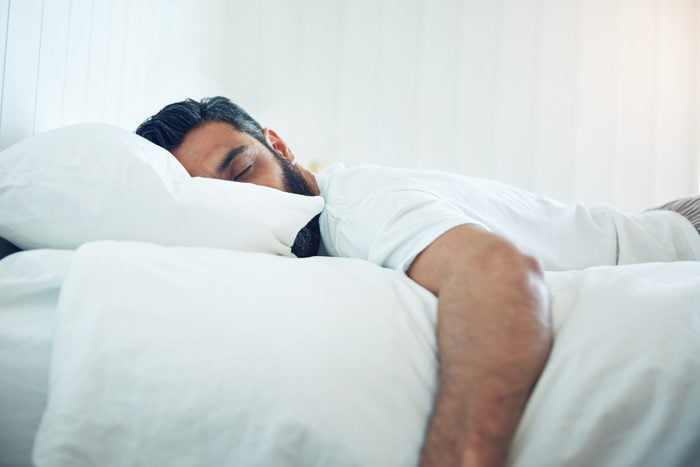Can’t Sleep? A New Study Found This Solution Was More Powerful Than Melatonin
Updated: Apr. 12, 2024

Snuggle up: if you've discovered that your melatonin supplement doesn't always do the job, a brand-new study may have found a more reliable—and even more natural—solution to help you sleep.
February 2022 data from the Journal of the American Medical Association suggested that over the past 20 years, the use of melatonin supplements to support healthy sleep has increased by 478%. If you’ve turned to this sleep hormone in pill form, you know that when a melatonin supplement does its job, it really helps. But if you’ve discovered that’s not always the case, a brand-new study may have found a more reliable—and even more natural—solution. Earlier this month, Swedish researchers shared their finding that another increasingly popular sleep aid was remarkably effective at triggering the release of melatonin in the body.
In the October 2022 study—which was published in the Journal of Sleep Research—26 men and women were asked to sleep one night with a weighted blanket, then one night without. After measuring the participants’ saliva for levels of three hormones (melatonin, oxytocin and cortisol), the study concluded that melatonin levels increased by an impressive 32% when participants slept with a weighted blanket.
5 Things Doctors Need You to Know About Weighted Blankets
Why a melatonin supplement isn’t always the best solution
Melatonin is a hormone the brain releases when it’s exposed to darkness, assisting in the regulation of your circadian rhythm to help you sleep. But there are factors that affect melatonin production. As examples, one 2012 German study published in Scientific World Journal pointed out that melatonin secretion decreases with age, as well as for many individuals who experience illnesses such as dementia, type 2 diabetes, and some cancers.
The blog for Johns Hopkins Medicine also points out that lifestyle patterns can affect the body’s melatonin output. Habits like using personal tech products and eating too close to bedtime can also make it more difficult for the body to produce melatonin and fall asleep.
Feeling Depressed? Stop Engaging in This Universal Habit, Says New Study
Further, the science behind the efficacy of melatonin is still up for debate. Melatonin supplements are made synthetically. Plus, according to the guidelines from the American Academy of Sleep Medicine and the American College of Physicians—there isn’t enough evidence to prove that taking melatonin can benefit chronic insomnia. Some doctors say that your melatonin receptors can desensitize with consistent melatonin use, and research even shows it can even induce depression.
Plus, according to the Sleep Foundation, some melatonin supplements contain less melatonin, or even more (up to 500%), than what the label states. Taking too much melatonin can result in unwanted side effects, such as headaches, changes in blood pressure, drowsiness, or vomiting, or other concerning effects.
12 Things That Happen to Your Body When You Take Melatonin
How to increase your melatonin naturally
Weighted blankets are known for providing deep pressure simulation, according to the Sleep Foundation. This means the controlled pressure from the weight can help to calm your nervous system, reduce anxiety, and increase sleep quality. That’s not to mention, as this study asserts: weighted blankets can even help you fall asleep faster when you’re feeling restless at night.
The Sleep Foundation offers additional explanation for why a weighted blanket can support sleep so beautifully: “Weighted blankets are said to work in the same way a tight swaddle helps newborns feel snug and cozy.” One interesting note worth mentioning: the researchers who led the Swedish study suggest that to be effective, the blanket should be around 12% of the individual’s body weight. To find the best weighted blanket for you, check out the 6 Best Weighted Blankets According to Amazon Reviews.
For more wellness updates, follow The Healthy on Facebook, Instagram, and Twitter. Get The Healthy @Reader’s Digest newsletter, and keep reading:

